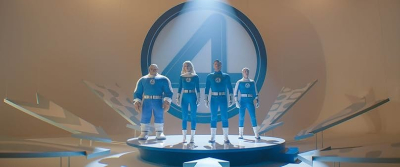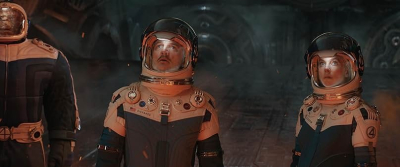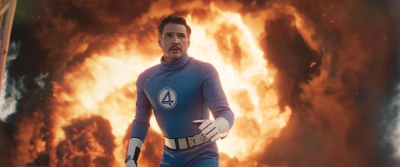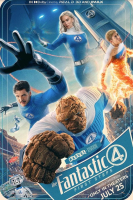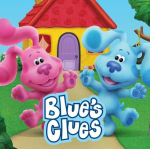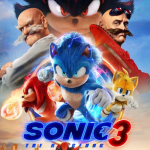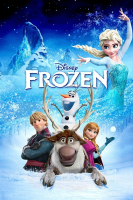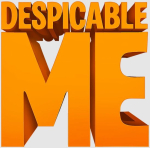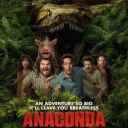The Fantastic Four: First Steps
When Marvel Studios announced their vision for “The Fantastic Four: First Steps,” it immediately suggested a sharp detour from both the MCU’s current tone and the infamously uneven history of the Fantastic Four on film. Matt Shakman’s 2025 entry is not so much a reboot as a full-scale renaissance—eschewing tired retellings and instead pitching Marvel’s most storied family into a radiant new universe of high stakes and emotional depth. The retro-futuristic, alternate 1960s setting is more than aesthetic; it’s a lens through which the entire film pulses with optimism, pulpy invention, and ambitious storytelling.
World-Building Through a Golden Age Lens
The genius of “First Steps” is apparent from the first shot: New York City, its skyline reimagined with the confidence and style of mid-century modern design. This is a utopian 1960s, colored by the wild idealism of the Space Race, where society moves to the rhythm of limitless invention and harmony—wonders made literal by the work of the Future Foundation, a think tank masterminded by Sue Storm. Streets buzz with proto-droids, chrome vehicles hover, neon splashes illuminate proud civic projects, and even the technology of the Fantastic Four feels both anachronistic and advanced.
Shakman and his design team go all in: the Excelsior spacecraft with its organic contours, the Baxter Building’s split-level laboratories and living quarters, the crackling comms rooms with wall-sized, analog computers—all perfectly in tune with the era’s hopefulness and Marvel’s own roots. The feeling is singular: this universe might be different, but it is unmistakably Marvel, and the Fantastic Four are its beating heart.
Cast Chemistry: A Family Already Forged
The film’s gamble pays off by letting us meet the Fantastic Four as seasoned, beloved figures—a rarity among superhero outings. Pedro Pascal’s Reed Richards is exactly the conflicted genius the franchise needed; Pascal gives Reed a magnetic blend of vulnerable father-to-be and relentless problem-solver. His dynamic with Vanessa Kirby’s Sue Storm is layered, melding domestic warmth, intellectual sparring, and uncertainty about impending parenthood. Kirby’s Sue is never defined by her relationship: she is a leader, visionary, and—crucially—capable of moral complexity, with subtle nods to her “Malice” alter-ego from the comics.
Ebon Moss-Bachrach’s Ben Grimm stands out for his quiet gravitas—his motion-captured transformation into The Thing is both visually stunning and fully inhabited, with Moss-Bachrach channeling equal parts pathos and dry humor. Joseph Quinn rejuvenates Johnny Storm as an overconfident but sensitive showman, his bravado sometimes masking the fear of being a sideshow. These four, together, bring forth something rarely seen on screen: a genuine sense of chosen family with scars, rivalries, and unbroken loyalty.
Villainy on a Cosmic Canvas
At last, a Fantastic Four film with a foe worthy of their legend. Ralph Ineson’s Galactus—towering, imposing, and true to his comic incarnation—lends the film a mythic scope. He is not the mustache-twirling villain or a formless cloud, but an intelligent cosmic presence, guided by ancient appetite but shaded by Ineson’s mournful gravitas. Julia Garner’s Shalla-Bal as Silver Surfer is equally groundbreaking, moving with ethereal poise and communicating a world of sacrifice through every glance and gesture.
Their scenes—borne on waves of Michael Giacchino’s reverent, yearning score—are among the film’s best: not just battles for planets, but debates on duty, existence, and what power is owed to those without it.
A Story of Responsibility, Not Just Superpowers
Dropping the origin story in favor of established relationships is perhaps the movie’s smartest move. Screenwriters Friedman, Pearson, Kaplan, and Springer center their plot on existential and societal dilemmas. Reed and Sue wrestle with the meaning—and risks—of raising a child under her global spotlight. Ben contends with self-acceptance and the deep bonds made possible only after great loss. Johnny learns to balance heroics with humility, gradually growing from showman to self-aware champion.
The threat of Galactus is cosmic, but at the film’s core is a debate about the stewardship of progress, the cost of maintaining a golden age, and the questions that any forward-looking society must eventually face. The faith in humanity—and the anxiety underlying it—feel as timely as ever.
Technique, Sound, and Spectacle
Jess Hall’s cinematography is a riot of color and scope: sharp lines, wide tableaux, and moments that recall both 1960s sci-fi and the grandeur of Kubrick’s best. Practical effects—model spaceships, physical robotics work for H.E.R.B.I.E., rich texture in costuming—bring a tactile authenticity. When CGI appears (the transformation of Ben, Galactus looming on the skyline), it serves the vision, not the other way around.
Michael Giacchino’s score is a vital pulse: retro brass and strings for the family scenes, swelling orchestral bombast for every planetary crisis. The theme captures both the heroic flight and the wonder of embarking on a journey no one else has dared.
Final Assessment
“The Fantastic Four: First Steps” is the bold leap that Marvel’s First Family always deserved. Pacific in its optimism, sophisticated in its storytelling, it rises above the genre’s conventions by believing in both science and heart. There is action, but more importantly, there is grace—every “first step” taken here feels earned, meaningful, and full of narrative promise. For MCU watchers, genre fans, or those simply looking to stream, download, or watch a blockbuster with both vision and soul, this film sets a new gold standard for what superhero cinema can be.
How to watch The Fantastic Four: First Steps online
Once “The Fantastic Four: First Steps” concludes its theatrical run after July 25, 2025, you’ll be able to watch it through digital platforms. Streaming will begin on Disney+ (subscription needed, with download for offline viewing supported). Amazon Prime Video and Apple TV will offer digital purchase and rental, online streaming, and downloads. Hulu and Peacock may carry it later in the release window. Free or unblocked access is unlikely at first but may emerge over time. The film is rated PG-13, in line with MCU standards for sci-fi action and thematic depth.
Pros
- Fresh, imaginative overhaul of the franchise’s setting and tone
- Main cast deliver layered, authentic, and emotionally gripping performances
- Story leverages established relationships for unique depth
- Visually thrilling blend of practical and digital effects
- Galactus and Silver Surfer receive mythic, respectful characterization
- Score uplifts and underlines every emotional beat
- Script finds honesty in humor, especially in the banter and family tension
- Complex themes handled with surprising maturity and optimism
Cons
- Minimal exposition may challenge total newcomers to the property
- Some supporting characters are pushed to the sidelines
- Pacing becomes meditative in stretches, slowing the action
- The alternate-1960s vibe may confuse viewers expecting “modern” Marvel
